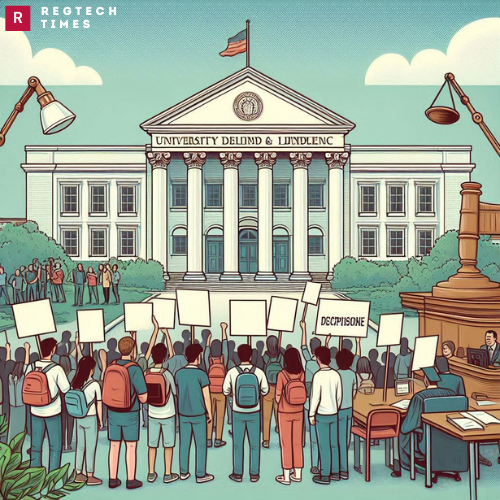In a recent decision that has ignited significant debate, the University of Georgia has upheld sanctions against six students involved in a protest over the Israel-Hamas conflict. This decision, announced by the University of Georgia’s Office of Student Conduct, continues to suspend the students through the fall semester and place them on probation for the remainder of their academic careers. The controversy surrounding this case highlights tensions between campus policies, freedom of expression, and political viewpoints.
Details of the Protest
On April 29, a group of students organized a protest near the office of University of Georgia President Jere Morehead, setting up an encampment to voice their opposition to the ongoing conflict in Gaza. This demonstration was part of a broader wave of student activism across American campuses, aimed at drawing attention to international issues. However, the protest at the University of Georgia led to the arrest of 16 individuals by campus police, with the six students in question subsequently facing disciplinary action.
University of Georgia’s Justification for Sanctions
The University of Georgia’s administration has defended its actions by asserting that the encampment violated campus regulations designed to ensure safety and order. According to University of Georgia spokesperson Greg Trevor, the encampments were deemed a threat to both students and faculty. The administration argues that the students were warned to disperse and chose to ignore these directives, thus opting to face arrest. In a statement, Trevor highlighted that the University of Georgia’s policies would remain in effect to safeguard the free expression rights of everyone in the community, while also ensuring that such activities adhere to relevant laws and regulations.
Student Reactions and Criticism
The disciplinary hearing, which took place on July 30 and lasted 13 hours, led to the decision to uphold the students’ suspension and probation. The students have the option to appeal this ruling to the University of Georgia’s vice president of student affairs. Their attorney, Josh Lingsch, has criticized the hearing as a “kangaroo court,” accusing the University of Georgia of unfairly targeting the protesters.
The students involved argue that their right to protest was unduly restricted and that their actions did not disrupt academic activities. They claim that the University of Georgia’s response was not merely a matter of enforcing rules but was influenced by political considerations. Ezra Lewis, one of the suspended students, expressed frustration, accusing the University of Georgia of “selective enforcement” and asserting that President Morehead has shown preferential treatment to pro-Israel groups on campus.“While it has been suggested that our punishment was content-neutral, President Morehead has evidently taken a political stance on Israel and displayed favoritism towards UGA Hillel,” Lewis said in a statement.
Faculty and Staff Reactions
The sanctions have not only sparked dissent among the affected students but have also drawn criticism from within the University of Georgia community. A petition signed by 180 faculty and staff members argues that the sanctions are “unwarranted and antithetical to our educational mission.” This internal dissent highlights a growing divide over how the University of Georgia should balance student activism with institutional policies and political neutrality.
Broader Implications for Campus Protests
The case has also stirred broader discussions about the role of universities in managing political protests and the extent to which free speech should be protected on campus. Critics of the University of Georgia’s decision suggest that it represents a troubling precedent for how institutions handle controversial issues and student dissent. They argue that universities should foster environments where diverse viewpoints can be expressed and debated openly, rather than imposing punitive measures that may stifle such expression.
In contrast, University of Georgia officials maintain that their primary responsibility is to uphold campus regulations and ensure a safe environment for all members of the community. They assert that while free expression is a core value, it must be exercised within the bounds of established rules and procedures.
As the students consider their options for appeal and the University of Georgia navigates the backlash from various stakeholders, the situation remains fluid. The outcome of this case could have significant implications for how universities address student protests and manage political expression on campus.
In the meantime, the University of Georgia faces mounting pressure to reconcile its policies with the principles of free speech and student activism. How the administration handles this case will likely set a precedent for future interactions between university authorities and student protesters across the nation.


